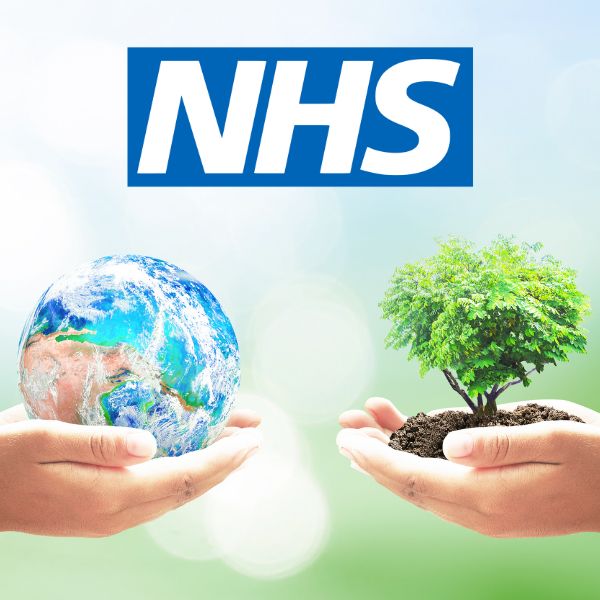What does sustainability mean to healthcare and the NHS?

As the world grapples with the increasing frequency of extreme weather events, there’s no denying that sustainability has become a critical challenge. Nowhere is this more evident than in the healthcare sector, a significant contributor to global carbon emissions. With the NHS committing to becoming the world’s first net-zero health system, sustainability has become a non-negotiable demand for both healthcare facilities and their suppliers. In this article, we’ll explore why sustainability is crucial for healthcare and what PDI International is doing to advance this vital cause.
The Carbon Footprint of Healthcare
The healthcare industry has a substantial carbon footprint, contributing to 5% of global greenhouse gas emissions, a number that’s projected to triple by 2050. [1] In the UK, the NHS alone is responsible for 6.3% of England’s carbon emissions, primarily due to emissions from its vast and complex supply chains. These include the production, transport, and disposal of medications, food, medical devices, and hospital equipment.[2]
However, the burden of disease is increasing, which places additional pressure on health systems worldwide to provide more hospital stays and medical appointments. Rising demand and inefficiencies, such as overprescribing, preventable medical errors, and the delivery of low-value care, will only serve to increase emissions from healthcare systems further, meaning it is becoming increasingly paramount to tackle these challenges head-on.
The Vital Role of Sustainability in Healthcare
Climate change poses a significant threat to our health, as well as our planet. There is a recognition that climate change undermines the core foundations of good health, contributing to cardiovascular disease, asthma, and cancer. Furthermore, addressing climate change can reduce the burden of disease from air pollution, obesity, and poor diets while directly tackling health inequalities.
Recognising this immense challenge, the NHS made history by becoming the first health system to embed net zero into legislation through the Health and Care Act of 2022. The NHS has committed to reducing its direct emissions (NHS Carbon Footprint) to net zero by 2040. However, a staggering 61% of NHS carbon emissions occur in its vast supply chain, which involves over 80,000 suppliers. This creates a substantial opportunity for decarbonisation.[3] Therefore, it’s also pledged to cut emissions it can influence (NHS Carbon Footprint Plus) by 2045 through the goods and services it buys from partners and suppliers.
To achieve these goals, all suppliers must prepare for key milestones outlined in the NHS’s roadmap to net zero by 2030. This includes a wide range of products and services, from medical equipment and pharmaceuticals to food and catering. Companies bidding for NHS tenders must complete the Evergreen Assessment, forcing them to evaluate their sustainability practices and make necessary changes where needed.
Time to ‘take the gloves off’
Gloves are one of the most commonly used plastic items in healthcare, with the NHS alone using 1.4 billion gloves annually. During the COVID-19 pandemic, a staggering 12.7 billion gloves were dispatched to the NHS and social care in England alone – enough to stretch to the moon! The carbon equivalent of this is equivalent to driving a petrol car around the Earth 8300 times.[4]
While gloves are essential for protecting healthcare staff when used correctly, overuse can lead to increased risk of cross-transmission, skin issues, and contact dermatitis. Research has shown that 60% of glove use in healthcare is inappropriate.[5] The “Gloves are Off” campaign urges healthcare professionals to use gloves only when there is a known risk of infection, limiting their use to situations involving blood, bodily fluids, or mucous membranes. This is particularly important as clean hands are known to be as effective a barrier as non-sterile gloves, where the patient is not infectious.
PDI International’s intelligently designed Hygea range of hand wipes are designed to offer better washing experiences, improved efficiency, and superior hygiene for both staff and patients. These wipes are gentle on all skin types and do not contain harsh detergent chemicals, reducing the risk of skin irritation.
The Environmental Impact of Healthcare Waste
The NHS is one of the largest producers of waste in the UK, generating approximately 156,000 tonnes of clinical waste annually.[6] This volume of waste underscores the crucial importance of efficient waste management practices for the NHS to achieve its ambitious goal of becoming carbon net zero by 2040. But it’s not just about meeting targets; it’s about minimising the significant environmental impact, curbing high costs, and reducing carbon emissions while reimagining how waste is managed in healthcare.
In the drive for sustainability, waste management emerges as a vital, often overlooked aspect. It is not merely a matter of disposing of waste; it’s about doing so in a way that is sustainable and minimises the burden on landfills. With responsible waste management, we can make a substantial impact in reducing the carbon footprint of healthcare operations.
A substantial portion of NHS waste has the potential for recycling, provided it is sorted correctly. PDI International is playing a pivotal role in addressing waste hierarchy issues within the NHS.
Our innovative approach includes the introduction of recyclable Sani-Cloth© and Hygea Hand Wipe canisters, developed for surface disinfection and quick hand hygiene respectively. In addition to promoting superior hygiene standards, these infection control disposables serve as the perfect solution for nurses and healthcare professionals who require efficient cleaning wipes for medical equipment. Our Sani-Cloth® wipes are specially formulated for disinfecting blood pressure monitors, thermometers, stethoscopes, and various other frequently used tools during patient check-ups. Even small steps, such as choosing recyclable disposables, can lead to significant positive changes in the healthcare industry!
How we’re helping
PDI International, a Made in Britain-certified company, is at the forefront of promoting sustainability in healthcare with a range of quality infection control solutions. We are soon launching our greenest range and continue actively working on a carbon reduction plan with the support of Positive Planet. Additionally, our contract manufacturing services are dedicated to helping customers launch green innovations into the market.
Commercial Director at PDI International, Mike Sullivan comments: “Sustainability is of paramount importance in healthcare, with the NHS setting ambitious targets to become the world’s first net-zero health system. PDI International’s contributions to sustainability, including reducing glove usage and promoting recyclable products, reflect the healthcare industry’s increasing awareness of the need for a greener, more sustainable future. By embracing these practices and innovations, healthcare can not only reduce its carbon footprint but also create a healthier and more environmentally friendly world for everyone.”
Find out more, visit: Healthcare – PDI International (pdi-intl.com)
References
[1] https://www.healthpolicypartnership.com/the-nexus-between-climate-change-and-healthcare/#:~:text=The%20healthcare%20sector’s%20environmental%20impact,fifth%20largest%20polluter%20on%20Earth
[2] https://www.plymouthhospitals.nhs.uk/positively-green/saving-the-planet-one-glove-at-a-time-6376/
[3] https://www.lpp.nhs.uk/categories/sustainability-social-value/sustainability/supply-chain/
[4] https://www.plymouthhospitals.nhs.uk/positively-green/saving-the-planet-one-glove-at-a-time-6376/
[5] https://www.sciencedirect.com/science/article/abs/pii/S0195670113003812
[6] https://www.england.nhs.uk/estates/nhs-clinical-waste-strategy/
Latest News
View AllPDI International celebrates its fourth Be the Difference® Day
PDI International Showcases Award-Winning Layered Approach to Tackle HAIs at Infection Prevention & Control Conference
